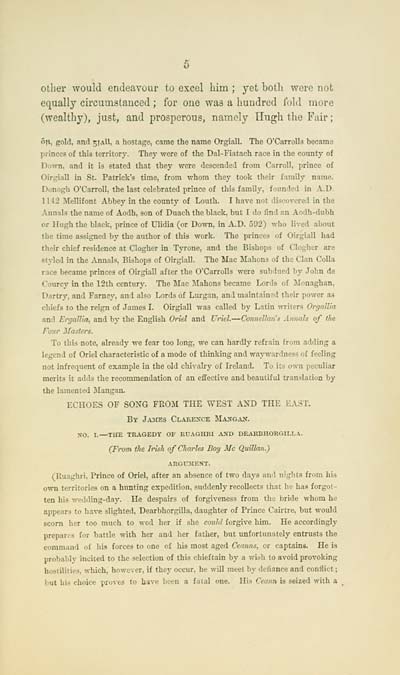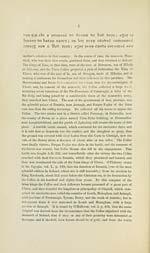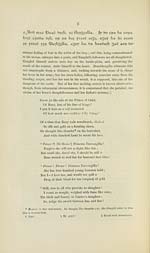Download files
Complete book:
Individual page:
Thumbnail gallery: Grid view | List view

otlier would endeavour to excel him ; yet both were not
equally circumstanced ; for one was a hundred fold more
(wealthy), just, and prosperous, namely Hugh the Fair ;
oft, gold, and jiaU, a hostage, came the name Orgiall. The O'Carrolls became
ininccs of this territory. They were of the Dal-Fiataeh race in the county of
Down, and it is stated that they were descended from Carroll, prince of
Oiriiall in St. Patrick's time, from whom they took their family name.
Donogh O'Carroll, the last celebrated prince of this family, founded in A.D.
1 U2 ^[ellifont Abbey in the county of Louth. I have not discovered in the
Annals the name of Aodh, son of Duach the black, but I do find an Aodh-dubh
or Hugh the black, prince of Ulidia (or Down, in A.D. 592) who lived about
the time assigned by the author of this work. The princes of Oirgiall had
their chief residence at Clogher in Tjnrone, and the Bishops of Clogher are
styled in the Annals, Bishops of Oirgiall. The Mac Mahons of the Clan Colla
race became princes of Oirgiall after the O'Carrolls were subdued by John de
< ourcy in the 12th century. The Mac Jlahons became Lords of Monaghan,
Dartry, and Farney, and also Lords of Lurgan, and maintained their power as
chiefs to the reign of James L Oirgiall was called by Latin writers OrgalUa
and ErgalUa, and by the English Oriel and Uriel. — Connellan's Annah of the
Four Masters.
To this note, already we fear too long, we can hardly refrain from adding a
legend of Oriel characteristic of a mode of thinking and waywardness of feeling
not infrequent of example in the old chivalry of Ireland. To its own peculiar
merits it adds the recommendation of an effective and beautiful translation by
the lamented Mangan.
ECHOES OF SONG FROM THE WEST AND THE EAST.
By JA.ME3 Cl.ajíexce Mangan.
so. I. — THE TRAGEDY OF RUAGHRI AND DEAEBHORGILL.^.
(From the Irish of Charles Boy Mc Quillan.)
ARGL-MENT.
(Ruaghri. Prince of Oriel, after an absence of two days and nights from his
own territories on a hunting expedition, suddenly recollects that he has forgot-
ten his wedding-day. He despairs of forgiveness from the bride whom he
appears to have slighted, Dearbhorgilla, daughter of Prince Cairtre, but would
scorn her too much to wed her if she could forgive him. He accordingly
prepares for battle with her and her father, but unfortunately entrusts the
command of his forces to one of liis most aged Ceanns, or captains. He is
probably incited to the selection of this chieftain by a wish to avoid provoking
hostilities, which, however, if the}- occur, he will meet by detiance and conflict ;
but his choice proves to have been a fatal one. His Ceann is seized with a
equally circumstanced ; for one was a hundred fold more
(wealthy), just, and prosperous, namely Hugh the Fair ;
oft, gold, and jiaU, a hostage, came the name Orgiall. The O'Carrolls became
ininccs of this territory. They were of the Dal-Fiataeh race in the county of
Down, and it is stated that they were descended from Carroll, prince of
Oiriiall in St. Patrick's time, from whom they took their family name.
Donogh O'Carroll, the last celebrated prince of this family, founded in A.D.
1 U2 ^[ellifont Abbey in the county of Louth. I have not discovered in the
Annals the name of Aodh, son of Duach the black, but I do find an Aodh-dubh
or Hugh the black, prince of Ulidia (or Down, in A.D. 592) who lived about
the time assigned by the author of this work. The princes of Oirgiall had
their chief residence at Clogher in Tjnrone, and the Bishops of Clogher are
styled in the Annals, Bishops of Oirgiall. The Mac Mahons of the Clan Colla
race became princes of Oirgiall after the O'Carrolls were subdued by John de
< ourcy in the 12th century. The Mac Jlahons became Lords of Monaghan,
Dartry, and Farney, and also Lords of Lurgan, and maintained their power as
chiefs to the reign of James L Oirgiall was called by Latin writers OrgalUa
and ErgalUa, and by the English Oriel and Uriel. — Connellan's Annah of the
Four Masters.
To this note, already we fear too long, we can hardly refrain from adding a
legend of Oriel characteristic of a mode of thinking and waywardness of feeling
not infrequent of example in the old chivalry of Ireland. To its own peculiar
merits it adds the recommendation of an effective and beautiful translation by
the lamented Mangan.
ECHOES OF SONG FROM THE WEST AND THE EAST.
By JA.ME3 Cl.ajíexce Mangan.
so. I. — THE TRAGEDY OF RUAGHRI AND DEAEBHORGILL.^.
(From the Irish of Charles Boy Mc Quillan.)
ARGL-MENT.
(Ruaghri. Prince of Oriel, after an absence of two days and nights from his
own territories on a hunting expedition, suddenly recollects that he has forgot-
ten his wedding-day. He despairs of forgiveness from the bride whom he
appears to have slighted, Dearbhorgilla, daughter of Prince Cairtre, but would
scorn her too much to wed her if she could forgive him. He accordingly
prepares for battle with her and her father, but unfortunately entrusts the
command of his forces to one of liis most aged Ceanns, or captains. He is
probably incited to the selection of this chieftain by a wish to avoid provoking
hostilities, which, however, if the}- occur, he will meet by detiance and conflict ;
but his choice proves to have been a fatal one. His Ceann is seized with a
Set display mode to: Large image | Transcription
Images and transcriptions on this page, including medium image downloads, may be used under the Creative Commons Attribution 4.0 International Licence unless otherwise stated. ![]()
| Early Gaelic Book Collections > J. F. Campbell Collection > Transactions of the Ossianic Society > Volume 5 > (45) |
|---|
| Permanent URL | https://digital.nls.uk/82282349 |
|---|
| Description | Dublin : Printed under the direction of the Council, 1854-1861. |
|---|---|
| Shelfmark | Cam.1.c.5-10 |
| Additional NLS resources: | |
| Description | Volumes from a collection of 610 books rich in Highland folklore, Ossianic literature and other Celtic subjects. Many of the books annotated by John Francis Campbell of Islay, who assembled the collection. |
|---|
| Description | Selected items from five 'Special and Named Printed Collections'. Includes books in Gaelic and other Celtic languages, works about the Gaels, their languages, literature, culture and history. |
|---|

